- Home
- Brian Falkner
The Tomorrow Code Page 16
The Tomorrow Code Read online
Page 16
Another stupid thought!
“Disappeared to where?” the reporter persisted.
“We have no information on that at this time.”
“Do you anticipate finding them alive?”
Crowe replied without emotion, “No, ma’am, we do not.”
The room grew suddenly, unnaturally silent.
Southwell broke the silence. “Civil defense are evacuating everyone in the projected path of the fog and are preparing an evacuation plan for Auckland, should that become necessary. I must stress that there is no need for panic. Any evacuation will be completed in plenty of time; we are asking residents to remain calm and at home until we make an announcement.”
“Yeah, right,” Fatboy muttered. “Fifty thousand people missing, but don’t panic!”
Southwell wore a rather drab, olive blouse and a staid gray skirt. She dressed older than her years. Her hair was pulled back in a loose ponytail, held together with a butterfly band.
“Is there any chance that a breeze will push this toxic fog out to sea?” a man asked.
“Toxic fog.” Tane sounded the words out loud.
“The movement of the fog does not appear to be governed by the direction of the wind.” Crowe answered the question, and the room grew completely silent again for a second or two as people tried to work out how that could be.
“Toxic fog,” Tane said again, blankly. Rebecca was staring at him with a horrified expression, but he ignored her and concentrated on the television.
“If the toxic fog continues on its present course and at its present speed, when do you anticipate it will hit Auckland?” the same man asked.
Crowe answered, “It’s hard to be accurate. The fog does not seem to move at a constant speed. It did not move from Whangarei at all for two and a half days. I would say we have about a week.”
The questions were coming from all over the room now.
“Is it true that the fog is growing in size?”
“Yes. Substantially.”
“By how much exactly?”
Crowe looked as if he would rather avoid answering that one, Tane thought. He turned the television louder.
“On our satellite photos, the fog was roughly circular and only a few hundred yards across when it entered Whangarei. It now measures several miles across.”
Rebecca said, “Several miles! That means it has grown by a factor of twenty or thirty times since it rolled into Whangarei. Or even more!”
Someone asked, “How many survivors are there?”
“Currently three. The youngest is a boy of four.”
“And what about the reports of snowmen in the fog?”
“We believe these sightings to be of people wearing biohazard suits, like this one.” Crowe motioned to his side, and an assistant wheeled in an inflated silver suit on a trolley. It looked more than anything like a space suit, although the faceplate was narrower, not as spherical as a NASA space suit.
Southwell moved around the front of the suit and placed her hand on it.
She said, “This is a UN-issue biohazard suit. It is silver but reflective. Surrounded by white mist, this would appear white also.”
A tall reporter whom Tane recognized from the TV3 news stood up and raised a hand, asking, “So there are men or women, inside the toxic fog, wearing protective suits. Can we assume that these people are responsible for the fog?”
“That would be a reasonable assumption,” Crowe answered as coolly as before.
“Then it would be another reasonable assumption that these people are terrorists. Bioterrorists,” the TV3 man said.
“Yes. Possibly. Probably. Yes.”
“Has there been any kind of demand or ultimatum?” someone else asked.
“No.”
There was a strange, stunned silence from the pack of reporters. Crowe stood impassively, waiting for the next question.
“So it is terrorists,” Fatboy said calmly.
“Maybe,” Rebecca said noncommittally.
“Why?” Fatboy asked. “Why here in New Zealand? What have we ever done to deserve this? What have we done to offend anyone?”
“What if…” Tane started, then paused, thinking for a second. “What if it’s a demonstration? What if their plan is to choose a small isolated country, release their toxic fog, and wipe the country clean? Everybody, gone.”
“Why would they do that?” Fatboy asked.
“Think about it. What kind of ransom could you demand then? From Australia, Britain, or the USA. They’d say, ‘Remember New Zealand. Land of four million people. Now just feral sheep and possums. You’re next if you don’t pay up.’”
“How do you plan to stop the fog from reaching Auckland?” a reporter finally asked on the television.
Crowe answered slowly. “The answer to that is in two parts. Firstly, we have taken samples of the fog, and we are analyzing it to see what we are dealing with. We hope to find a way of neutralizing it before it gets to Auckland. Secondly is the matter of dealing with the terrorists, with the”—he almost smiled, Tane thought—“snowmen. We have set up a line of defense just north of Orewa. We have taken the high ground of the Waiwera hills and will be aiming to prevent either the fog or the terrorists from proceeding beyond that point.”
“Who will be manning that defensive line?” It was an anonymous voice from somewhere in the crowd of reporters.
“My own men, from the U.S. Army Bioterrorism Response Force, along with your Special Air Service and units of your regular army. All will be outfitted with biohazard suits like this one. Eighty of the New Zealand Army Light Armored Vehicles will be deployed along the line, leaving twenty-five in reserve. As you no doubt know, these vehicles are also protected against chemical and biological agents.”
“That’s a lot of firepower,” somebody said.
Crowe nodded. “In addition, we will have air-strike capability from FA18 Super Hornets flying off the USS Abraham Lincoln, which will be within striking distance within three days. Whatever, whoever, is causing this, we will stop them at the Waiwera hills.”
“What about the children?” the TV3 man asked. “The ones you have been looking for, from the island.”
“We’re still looking,” Crowe said noncommittally. “We think they may have some information that will help us.”
Someone shouted out, “What kind of information?” but Crowe ignored it.
When the press conference finished, Tane turned the sound down but left the television on, in case there were any more developments.
They all sat in silence for a while, until Tane finally spoke.
He said again, “Remember New Zealand, land of four million people….”
FTBY DNT GO
Fatboy went around to Goony’s house to pick up a pair of overalls, and while he was gone, Rebecca came and sat next to Tane. She put her hand on his arm.
“What have we got ourselves into?” she asked.
Tane didn’t answer. There was no answer to give.
He covered her hand with his own, and she leaned forward, touching her forehead to his.
“We’ll always be mates,” she said. “Whatever happens.”
“I hope so,” Tane said.
Rebecca leaned back a little and nodded. “I know so. I just wanted to make sure you knew too.”
“I never doubted it,” Tane lied, thinking about the argument on the submarine and feeling more and more guilty about it.
“Friends forever,” she said, and sat with him silently for a while before moving off into the kitchen to get herself a drink, leaving Tane with such a warm feeling that it was as if she was still sitting next to him.
Friends forever. Friends since forever.
The feeling was still there when Fatboy came back with a pair of clean, white overalls, emblazoned with Telstra-Clear across the front and back.
“The genuine article,” Fatboy said proudly. “Goony once worked for them.”
Tane asked, “Didn’t he ask any questions abo
ut why you wanted them?”
Fatboy nodded. “He did. The answer was a thousand bucks.”
Tane laughed.
“When do we do it?” Rebecca asked. “When do we install the Chronophone?”
“Security is going to be a real problem,” Fatboy said. “It’s a casino, so they have tight security anyway. These days with terrorist alerts all the time, they are going to look pretty suspiciously at anyone wandering around the Skytower with a suitcase.”
“Even in your lovely new overalls?” Tane asked.
“Even in my overalls.”
The satellite dish they were going to use belonged to Telstra-Clear.
Tane had carefully stenciled the name of the company on the side of the aluminium briefcase also, so it would look like a toolbox.
“Are you sure you should be doing this alone?” Rebecca asked. “Wouldn’t it be safer with two?”
Fatboy shook his head. “We talked about this already. Neither of you looks old enough to be a Telstra-Clear technician.”
In some ways, Tane wished he was going. This was the climax of the creation of the Chronophone, the greatest invention since the telephone, or the airplane, or maybe just the greatest invention ever. And he, Tane Williams, had thought of the idea that had started it all. And nobody knew. Maybe nobody would ever know. It seemed wrong not to be there at the critical moment.
In other ways, though, he was glad he was not going. Fatboy would have to take an elevator over two hundred yards straight up, to the main observation deck, then another elevator up another fifty yards to the Sky Deck. Then it was a climb up the internal ladders to the crow’s nest, a tiny platform on the outside of the Skytower, three hundred yards high. But even that wasn’t the end of it. The Telstra-Clear satellite dish, one of many atop the tower, was another fifteen yards above the crow’s nest, accessible only via a ladder up the side of the topmost spike of the tower.
He would have to do all this lugging a heavy metal suitcase. It would take steady nerves and a fair bit of strength.
“Better get on with it,” Fatboy said determinedly. Tane sensed that he was more nervous about the climb than he was letting on.
“Good luck,” he said as Fatboy climbed into the overalls.
“Final test?” Rebecca suggested.
“Suppose we’d better,” Fatboy replied.
They had been testing and testing the Chronophone. The last thing they wanted was for it to fail, once it was high above the ground.
“I’ll do it.” Tane disappeared into Rebecca’s room, where her laptop was sitting on a small study desk.
He opened the small program that Rebecca had written and typed in “good luck Fatboy,” then clicked SEND.
The small radio transmitter attached to the laptop would now be sending the message to the receiver built into the Chronophone. Inside the case, a small digital readout would be displaying the characters he had just typed, as it encoded it into the gamma-ray disruptor signal. Right now, that was as far as the signal would go. It needed the big satellite dish on the Skytower to be able to transmit the signal to the gamma-ray bursts.
There was no “Okay” from the kitchen to acknowledge the receipt of the message, so he tried again. “Don’t look down,” he typed, and sent it.
Still silence from the kitchen, which was a little odd. All the previous tests had worked fine.
He was just about to wander out to see for himself what the problem was, when a flashing light caught his eye on the side of the screen.
Another message!
Rebecca’s software now checked the NASA site hourly for new BATSE messages and automatically decoded them.
He clicked on the flashing light and it opened the BATSE message window. As usual, it was a cryptic jumble of letters and numbers that they would have to try and figure out as quickly as they could.
FTBYDNTGO.WTRBLSTMPS.DSVLETHM.
SLTABS.DNTABSRB.
There were still some parts of previous messages that they hadn’t fully understood.
WTRWKS for example.
He printed a couple of copies of the message on the inkjet, to show it to the others, and as he was doing so, the first nine characters caught his eye.
FTBYDNTGO.
He caught his breath and tried to make any other interpretation from it, other than the obvious. FTBY DNT GO. Fatboy don’t go!
“Oh crap!” He grabbed the printout, knocking the chair over in his haste to get out to the kitchen. The second copy whirred swiftly out of the printer behind him.
He rushed down the short hallway and in through the swing door.
The Chronophone was open on the kitchen table, and even from the doorway he could read the words DON’T LOOK DOWN visible on the display.
Fatboy couldn’t see them, though. Neither could Rebecca. He had his arms around her, and she had her arms around him, lost in each other’s world. As Tane entered, her lips met his.
Friends forever!
Any remnants of the earlier warm feeling died a sudden cold, jagged death. His breath caught in his throat, and a black rage that he hadn’t known existed inside him welled up from deep within his belly. He forced it back down and coughed, loudly. They both looked up, startled.
“What is it, Tane?” Rebecca asked in alarm, taking a quick step away from Fatboy.
Tane stared at them, breathing heavily through his nose.
“What is it?” Fatboy asked.
He looked at them both for a moment longer. “Nothing,” he said tightly. There was a ringing in his ears and spots dancing across his vision. He folded the piece of paper discreetly behind his back and slipped it casually into a pocket. “Nothing.” He laughed. “I thought the Chronophone had stopped working, because I didn’t hear anything from you two, but I see that it’s all okay.” He gestured at the message on the readout.
Fatboy looked at the message and laughed.
Rebecca just looked at Tane, in a rather strange way, and said, “We were just saying goodbye.”
“Yep,” Tane said, “I could see.”
CANDID CAMERA
When Fatboy left, Tane and Rebecca busied themselves with the supply barge. They called it a barge, but it was really more of a cage. A large plastic-coated wire box with floats attached.
When loaded with supplies, it was just buoyant enough for the Möbius to tow, without dragging the little submarine to the bottom or floating up to the surface.
Fully loaded, it had room for twelve crates.
The crates themselves were watertight plastic boxes, with a rubber seal around the rim, purchased from a local plastics shop. They would not be able to withstand pressure, but they were being stored in shallow water, so that wasn’t a problem.
This was the last load. There were already over a hundred crates stacked neatly in rows on the bottom of Rangitoto Cave, as they had come to call it. By Rebecca’s careful calculations, there was enough food and fresh water there to last four people for over a year, or six people for at least nine months. Rebecca’s mum didn’t know it, but she had a berth booked on the submarine. So did Tane’s mum and dad, but they didn’t know it either.
How do you explain to your parents that the country you live in is about to be devastated and that the only hope of survival is to live in a submarine in an underwater cave for the conceivable future?
This last load was probably the most important. Oxygen cylinders and Sofnolime cartridges. The oxygen cylinders replenished the air in the sub, and the Sofnolime cartridges removed the carbon dioxide that they breathed out.
While they had the air hose up to the surface, they wouldn’t use either, but they had planned for a long period of time when they would not be able to draw in air from above the waves.
They would only do that when they were sure the air was safe and clean, and there was no real way of knowing that, so they planned for at least the first few months to be entirely sealed off from the rest of the world.
They worked as a team in the small wooden boatshed but s
aid little. Rebecca loaded the cylinders and cartridges into the plastic boxes, and Tane stacked them onto the barge. He wanted to talk but found that there was little to say. There was a strangeness about Rebecca that hadn’t been there before he had walked in on them in the kitchen. It was as if she had something to say but was afraid to.
He thought about showing Rebecca the message, but was too embarrassed. Instead, he tried to ring Fatboy after a while, feeling guilty about letting him go, when the message said not to. Maybe it wasn’t too late. But Fatboy’s phone rang and rang, then went to the answering service.
It took them over an hour to load up the barge. There were a few spare cylinders that would not fit in the last few plastic crates, so they just loaded them on board the Möbius. You never knew when you might need them.
Rebecca flopped, exhausted, into one of the lawn chairs in the backyard of the house and stared silently out over the water toward the city. Tane looked around to make sure they had everything and noticed the laptop still sitting on the outdoor table.
He packed it up and took it down to the Möbius, holding it carefully as he negotiated the wooden staircases that led down to the boatshed.
Halfway back up the staircase he heard the phone ring. He hurried to the top in case it was Fatboy. Rebecca was waiting for him, the phone in her hand.
“It’s for you,” she said.
“Who is it?”
“I don’t know.” She shrugged.
So it wasn’t Fatboy.
Tane put the phone to his ear but heard only the pip, pip, pip of a disconnected line.
They walked back to the house together silently, uncomfortably. Rebecca’s mum popped her head out of the open window of her room.
“There you are!” she called. “I’ve been looking everywhere for you!”
“Are you okay, Mum?” Rebecca called back, but her mother interrupted her.
“You’re on the TV! You and Tane and um…Tane’s brother.”
Tane looked at Rebecca. Surely she meant the police sketches. But there hadn’t been a picture of Fatboy.
Simultaneously, they broke into a run, hurtling through the ranch slider of the lounge to the big TV in the corner.

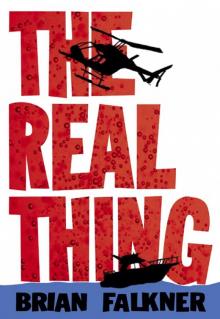 The Real Thing
The Real Thing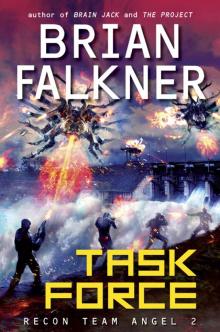 Task Force
Task Force The Flea Thing
The Flea Thing The Project
The Project Clash of Empires
Clash of Empires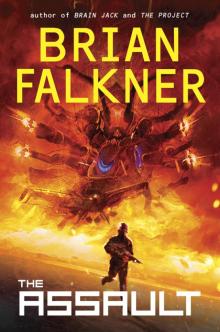 The Assault
The Assault Brain Jack
Brain Jack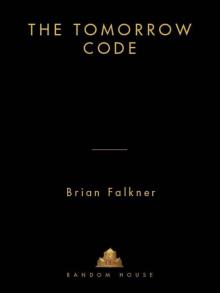 The Tomorrow Code
The Tomorrow Code Vengeance
Vengeance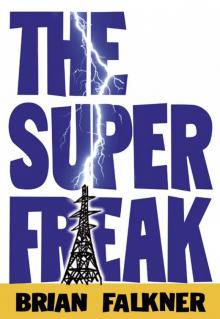 The Super Freak
The Super Freak Northwood
Northwood Cave Dogs (Pachacuta Book 1)
Cave Dogs (Pachacuta Book 1) Maddy West and the Tongue Taker
Maddy West and the Tongue Taker